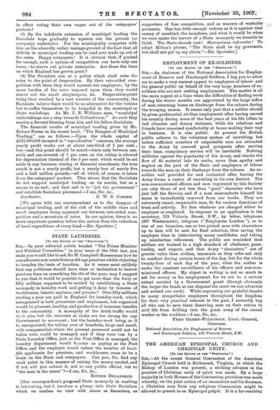STATE LAUNDRIES.
[To THE Eorroa Or TEE "SPECTATOR."] Sru,—In your editorial article headed "The Prime Minister and Political Unrealities " in your issue of the 16th inst. you state you would like to ask Sir H. Campbell-Bannerman how he can advocate non-contributory old-age pensions whilst objecting to broaden the basis of taxation. As it seems most unlikely that any politician should have time or inclination to bestow precious time on remedying the ills of the poor, may I suggest to you that it would be possible to get more than the forty or fifty millions supposed to be needed by establishing a State monopoly in laundry-work and getting it done by inmates of workhouses, lunatic asylums, and prisons ? Over fifty millions sterling a year are paid in England for laundry-work, which unorganised is both precarious and unpleasant, but organised would be pleasant, healthy, and productive of immense benefits to the community. A monopoly of the drink traffic would do it also, but the interests at stake are too strong for any Government to surmount ; but the laundry-work being, as it is, unorganised, the taking over of laundries, large and small, with compensation where the present personnel could not be taken over, could be managed, and if they were run by a State Laundry Office, just as the Post Office is managed, the laundry department would 133come as paying as the Post Office, and the employes would reduce the number of bond- fide applicants for pensions, and workhouses cease to be a drain on the State and ratepayers. Can you, Sir, find any weak point in this manner of raising the money needed, and if not, will you submit it, not to any public official, but to " the man in the street"?—I am, Sir, &c.,
ESTHER DELAFORCE.
[Our correspondent's proposed State monopoly in washing is interesting, but it involves a plunge into State Socialism which we confess we view with alarm as financiers, as
supporters of free competition, and as wearers of washable' garments. One has little enough' redress as it isagainst that enemy of mankind, the laundress, and what it would "be when we were under the barrow of a State monopoly we tremble to think. The State-shrunk vest! Horrescimus references! • To adapt Milton's phrase, " The State. shall be my governors, but shall not get up my shirte."—ED. SpeCtator.]


















































 Previous page
Previous page